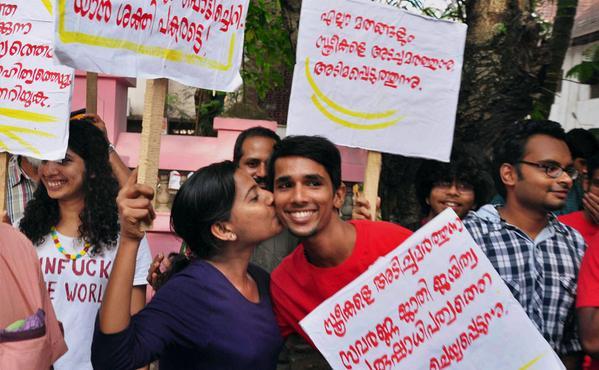Indians stage a protest for the right to kiss
Protesters take part in the "Kiss of Love" rally in Kochi, India.
India has laws against public obscenity, and for some that includes kissing in public. On Sunday, protesters decided to test their freedom by participating in a mass kissing rally. And more than a dozen were detained — though the charge was unlawful assembly rather than obscenity.
The protest was spurred by a violent reaction to a local TV story in Kerala province that showed couples kissing near a cafe in the port city of Kochi. Members of the BJP youth group, a wing of India's ruling party, were so angered by the public display of affection — and the lack of police action against it — that they vandalized the cafe. And that led organizers to plan Sunday's "Kiss of Love" public protest.
The BBC's Trending desk reports that thousands of people showed up, though many came to watch the smooching rather than participate.
(Editor's note: The Global Scan can be delivered straight to your inbox every weekday. Just register and sign up today.)
A Thai village offers luxury care to Alzheimer's patients
For many families, there are few good choices when it comes to caring for a loved one with Alzheimer's Disease. Home care can be difficult and stressful. Nursing facilities often feel soul-less and are expensive. So some Europeans with forms of dementia are heading to Chiang Mai, a village in northern Thailand, where the weather is warm, the care is personal and life can be luxurious.
Northern Thailand has long attracted pensioners from France, Britain, Japan and the US looking for good weather and low cost. The South China Morning Post Magazine reports that Chiang Mai is now sprouting group homes and resorts that offer 24-hour care, complete with Western cuisine, resort facilities and something more important — nurses who work with a single person and come from a culture that views serving the elderly as an honor.
Personal, round-the-clock care can cost upwards of $8000 a month in the US or Europe. In Chiang Mai, it can cost about $3,000. And while uprooting someone who is already losing memories is difficult, so is finding quality, affordable care.
Where do you find the best single-malt Scotch? Try Japan
Whisky expert Jim Murray just published the latest edition of his Whisky Bible. And to the surprise of many, not a single Scottish distillery made it into his ranking of the top five single malts. By Murray's reckoning, the world's best Scotch comes from the Yamazaki distillery in Japan. Three more of the top five come from the US.
Murray says the reason is simple — these distilleries are actually more traditional. He told PRI's The World that the best competitors are returning to "how Scotch whisky was made 30 to 40 years ago. It's like strapping yourself in a time machine." For his research, he sampled more than 1,145 whiskies. It's a tough job, but someone has to do it.
How about some fries with that wormburger?
If you think "eat local" is the latest mantra for sustainable food, think again. The new mantra may be "eat insects."
It's estimated that a couple billion people eat insects regularly and they consume roughly two thousand different types. Now the Dutch supermarket chain Jumbo plans to sell insect products, including burgers made from mealworms and crispy snacks of moth larvae. Bugs — from cicadas to crickets and silkworms to spiders — are ending up on the menus of restaurants around the world.
The delicate taste, apparently, is just one reason to enjoy insects. When it comes to protein, pound for pound, bugs are far more sustainable than meat — using less water, less land and producing less greenhouse gases and waste. PRI's To the Point interviewed entomologist Marcel Dicke of Wageningen University, who has just written "The Insect Cookbook."
What we are seeing on social
Weather around the world
The arrival of November was very different on the two sides of the Atlantic. In western Europe, areas in France, Germany, Holland and Belgium all broke records for heat, ranging into the high 60s or low 70s Fahrenheit (around 20 degrees Celsius.) While in the eastern US, record early snowfalls of over 20 inches (51 cm.) hit high elevations in Maine, North Carolina and Tennessee. Weather Underground reports the cold was also unusual, but only broke records in parts of Florida.
